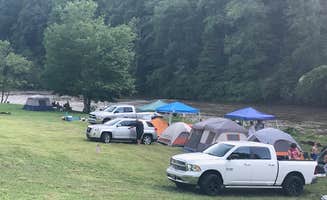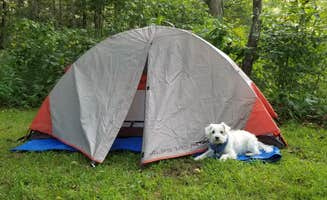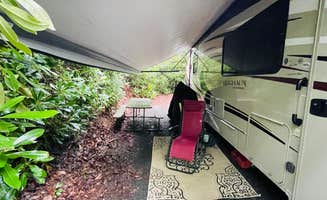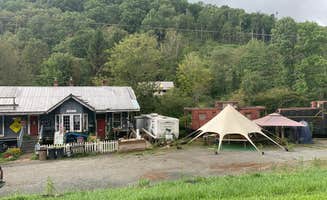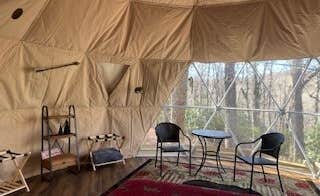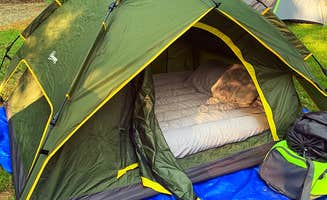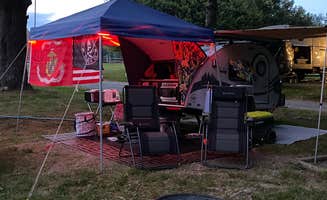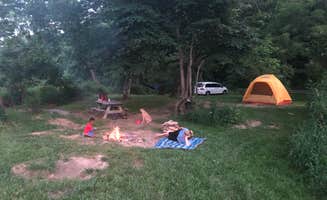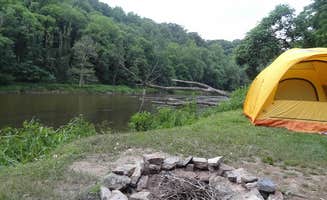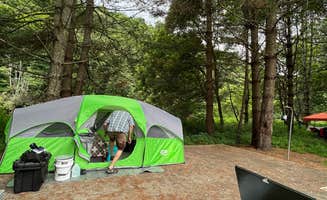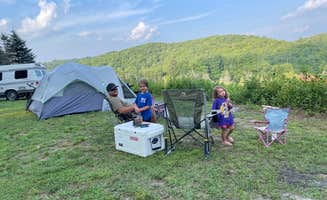The northern North Carolina mountains surrounding West Jefferson sit at elevations between 3,000 and 6,000 feet, creating microclimates that maintain cooler temperatures even in summer months. Campgrounds in this region typically experience 10-15 degree temperature drops after sunset, with morning fog common in valley locations. Several camping areas near West Jefferson provide access to the South Fork of the New River, one of only 14 American Heritage Rivers in the United States.
What to do
Fishing opportunities: 2-3 miles of trout streams at Helton Creek Campground provide excellent angling. This location offers "Delayed Harvest trout stream, well stocked in spring, larger fish stocked in fall, October I think. Probably 2-3 miles of good fishable water," according to Scott G.
Wild pony viewing: 1.5 mile hike required from most camping areas in the region to see the feral ponies. At Grayson Highlands, "What a great site. Terrain changes throughout with dense forest and brushy ridgelines. Makes for a really great hike and camp. Several Backpacking sites just past Mt. Rogers summit trail. Worth a few nights stay," shares Caitlin L.
Mountain biking: dedicated trail system within 15 minutes of several campgrounds. "Close to downtown Boone and trails. Great mountain bike park nearby. We really enjoyed the Booneshine brewery after our hikes and mountain biking," explains Joe B. who visited the area.
Kayaking and canoeing: multiple river access points for paddling trips ranging from 2-6 hours. One visitor at Twin Rivers Family Campground found "crystal clear river water, kayaking, canoeing, fishing, and just plain taking it easy away from all the hustle and bustle of daily life."
What campers like
Privacy between sites: varies dramatically by campground. At Blue Bear Mountain Camp, "The campsites are very spaced out. The elevation is high so weather is nice for those trying to escape the summer heat," notes Kristen J.
Temperature advantages: 70-80°F even in July. The higher elevation camping areas maintain comfortable conditions when lower elevations swelter. One camper at Blue Bear Mountain Camp explained, "Not only is the weather so much cooler in the summer there (70-80 in July!), it's just a wonderful, down to earth place to be."
Clean facilities: daily maintenance at most sites. Campers consistently mention bathhouse cleanliness as a highlight. At Wagoner — New River State Park, Chelsea B. appreciated the "super clean restrooms and showers, amazing visitors center, plenty of hiking trails, just a short hike or drive down to the river."
Water features: stream and river sounds enhance many camping experiences. Matt D. at Helton Creek noted, "Quiet and calm. Any outside noise is washed away by the stream."
What you should know
Tent pad conditions: may require maintenance. Some camping areas have issues with drainage and erosion. At Julian Price Park, one visitor observed, "The tent pad needed some maintenance since the dirt had washed onto it and made it slightly sloped."
Cell service: limited coverage in mountain valleys. Several campgrounds have specific spots where signal can be found. Jean C. reported that at Hickory Ridge Campground — Grayson Highlands State Park, "For cell phone coverage (Verizon), I had success at the viewpoint on the way up from the entrance. It was also where I watched the sunrise."
Seasonal closures: check before traveling between November and March. Many campgrounds close completely or offer reduced services. Julian Price Park operates "Apr 01 to Oct 29" according to their listing.
Weather preparation: temperature swings of 20+ degrees can occur within 24 hours. Danielle H. advised that "Grayson Highlands is a must-do for all campers, hikers, and adventurers. Hit the trails to see some wild ponies and scenic balds. Weather is unpredictable, so pack a raincoat and warm clothes just in case."
Tips for camping with families
Kid-friendly activities: fishing ponds and playground equipment at several locations. At Raccoon Holler Campground, one family found "plenty of things for the kids and the adults to do there. It's also a great place for photography with all the scenery!"
Wildlife viewing: early morning best for deer sightings. Parents can take children to meadow areas within campgrounds at dawn. Charli R. reported at Stone Mountain State Park, "There's a roaring large creek that flows behind the site and a grassy field full of deer beside it."
Swimming holes: some require short hikes. Several campgrounds feature water access for hot days. At Twin Rivers Family Campground, "Our site (#3) was right on the New River. There are some permanent sites, tent sites, RV sites, and several primitive sites."
Movie nights: weekly at select campgrounds during peak season. Several family-oriented parks host outdoor activities. At Honey Bear Campground, one ranger reviewer advised, "Check with the office for the Saturday night movie! Weather dependent, they show a movie outdoors on the front lawn."
Tips from RVers
Water hookup limitations: fill at central stations. Some campgrounds require RVers to fill tanks upon arrival. At Blue Bear Mountain Camp, a visitor noted, "They do not have water hookups - you fill your camper tank with water at the office area."
Road access challenges: steep grades on some access roads. Mountain campgrounds often have challenging approaches. Kristen J. observed that at Blue Bear Mountain Camp, "The state maintained gravel road used to access campground was narrow and would be difficult to get a large camper up there, although there were lots of large ones there."
Site leveling requirements: bring substantial blocks. The terrain often requires equipment to achieve level setups. One camper at Stone Mountain State Park Campground mentioned, "The campsites are mostly level, well maintained and have tent pads, tables and fire rings."
Dump station fees: $17 at some locations when not staying at the campground. Mike A. noted while visiting New River State Park, "Nice looking camp in a beautiful area. Didn't stay but did use the dump station for $17, so wanted to update info."


